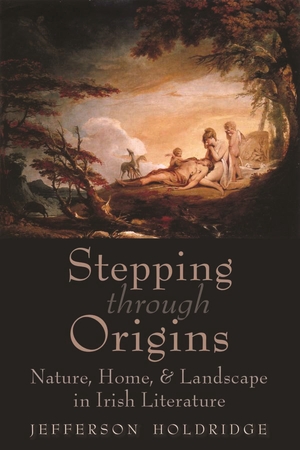A new critical work from Prof. Jefferson Holdridge: “Stepping through Origins”

Professor Jefferson Holdridge’s new book examines the role of the Irish landscape in literature. Stepping through Origins: Nature, Home, and Landscape in Irish Literature, published in January 2022 by Syracuse University Press, “addresses the place of the aesthetics of nature, landscape, and family in Irish literature, demonstrating how nature is associated with a complex web of Original Sin, colonial conquest, and Oedipal guilt, and how finally some contemporary writers in their acknowledgment of the ecological movement have moved beyond this construction” (from the publisher).
Professor Holdridge will give a book talk for the campus community and the public on Monday, April 18, at 4 p.m. in DeTamble Auditorium (Tribble A110).
Jefferson Holdridge is professor of English at Wake Forest and the director of the Wake Forest University Press, the major publisher of Irish poetry in North America. He is the author of two other critical texts, The Poetry of Paul Muldoon (2008) and Those Mingled Seas: The Poetry of W. B. Yeats, the Beautiful and the Sublime (2000). He has edited and introduced two volumes of The Wake Forest Series of Irish Poetry, as well as Post-Ireland? Essays on Contemporary Irish Poetry, which he coedited and introduced with Brian Ó Conchubhair in 2017. He is also the author of four volumes of poetry: The Wells of Venice (2020), The Sound Thereof (2017), Devil’s Den and Other Poems (2015), and Eruptions (2013).
Description from Syracuse University Press:
Since the eighteenth century, landscape has played complex psychological and political roles in the narrative of Irishness, entailing questions of memory, family, home, exile, and forgiveness. In Stepping through Origins, Holdridge explores the interplay of these concepts in literature. For Irish writers from Swift to Heaney, the Irish landscape has remained not only a reflection of Irish troubles but, much like aesthetic experience, a space in which the bitterness of family or national life can be understood, if not entirely overcome. Through deft analysis of works by leading Irish writers including Lady Morgan, Yeats, Joyce, Louis MacNeice, and Elizabeth Bowen, Holdridge expands and enriches our understanding of how landscape has served as a palimpsest for both family and country, connecting personal with collective memory, localized places with their regions, and individual with national identity.
“Holdridge makes fascinating and sometimes surprising connections that thoughtfully invite the reader to seriously interrogate the imaginative and historical consequences of the nature/culture divide.”
—Christine Cusick, Seton Hill University
“This is an ambitious and wide-ranging study on an important nexus of concerns prominent in Irish writing for more than 200 years. . . . Given current critical interest in spatial concerns in Irish literature and culture, this work is well positioned to make a significant contribution to the field.”
—Lucy Collins, University College Dublin
“This theoretically nuanced study is a wide-ranging substantial contribution to the developing field of Irish ecocriticism.”
—Terence Brown, Trinity College Dublin
Categories: Faculty News
